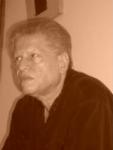I: “Boustrophedon”
1.
You and I.
2.
Shall begin at zero.
3.
Here is neither you nor I;
and yet we’ll crisscross
these lines together.
Like hands on a clock,
in two separate times we will live
night and day.
4.
I rely on you, I invent you
as I invent myself,
an Other in my own shadow and in yours.
5.
I call you myself. You call yourself me.
Your name is my tongue.
I pronounce you in each word.
6.
Akkadian, Hittite, Elamite, I learn
to write upslope in the dark;
earthbound the oxen teach
how to read with padlocked eyes.
Chasms on the surface,
heaving pores, volcanoes
where invisible Hades breathes,
words look like furrows.
7.
The hand you follow is not there.
You stalk trampled seeds, wedges,
Footprints that trace the path.
My breath hesitates in offering
words that will be alien,
perhaps more yours than mine.
8.
To reach a border only to
trace again the same turn,
carve once again the same furrow,
to dream my own fullness with no harness,
to mount the low land, to inseminate it,
flooding the margins
with festoons of seminal streams.
9.
I was here on 24 October 2014.
I carved some lines to leave trails behind.
Dark, fecund.
10.
I don’t know what I have said.
I don’t know what I keep to myself.
11.
I felt ancient
12.
and now perhaps I am.
13.
Oxen of the low land,
fishes from a turbulent river,
alone side by side,
only two syllables,
14.
you and I.
II: “The Destruction of the Present”
There is in us something immortal
that wishes it could die with all that is mortal.
Antonio Machado
Taste, sound, image.
They absorb, contain, seize.
The sensation intensifies, it plumbs the depths. The immediate is prolonged until it annuls itself.
The present stands still, turns sparse, disappears into other pasts that do not pass, that happen right now, and continue and shall continue to happen, as a dream or remembrance.
To awake inwardly where I myself linger, as if I wanted to halt it, recall it, trying to recover its curves and rotations so as to remain there, reconstructing another and yet another past, penetrating its here and now like a page entering an envelope in order to head toward the light or to the street’s clamor, until step by step I reach my own body, where suddenly I feel anchored, where perhaps I will dissolve like a handful of salt in the words that will let me rest right here, below, surrounded not by light and din but by algae and coral reefs, between gills that breathe, reducing me, sifting me, foreseeing drop by drop the turbulent whirl.
The sensation of weight at the bottom of the page, where I have fallen, and where I lounge in a deep surface after I have paused on a remembrance that rolls on itself, turning me away from my starting point that is the present, or was the present, since for some time it has remained still, like the point of a compass that turns and spins, drawing countless circles of radii that stretch or contract from one and the same center.
Thus I have no other way out but to make a notation, scribbles on strips of paper left on a drawer that by chance I discover months or years afterward only to yet again lose myself in the web of words and syllables with the hope that they will set sail, begin on a clean page, to leave port toward no known direction.
Meanwhile, here I am.
III: “Bird”
Did you see it? Just now it leaped
from that verse to this one.
You don’t see it? It’s there,
In what you have just read.
You mean you don’t hear it?
You don’t hear it either?
What a pity. It’s gone.
Translated by Roberto Cantú



